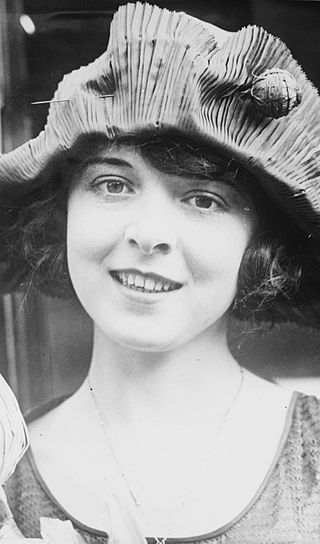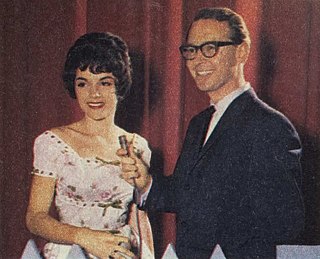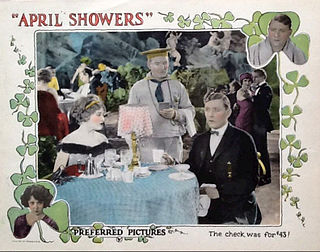
Kate Douglas Wiggin was an American educator, author and composer. She wrote children's stories, most notably the classic children's novel Rebecca of Sunnybrook Farm, and composed collections of children's songs. She started the first free kindergarten in San Francisco in 1878. With her sister during the 1880s, she also established a training school for kindergarten teachers. Kate Wiggin devoted her adult life to the welfare of children in an era when children were commonly thought of as cheap labor.
1917 in film was a particularly fruitful year for the art form, and is often cited as one of the years in the decade which contributed to the medium the most, along with 1913. Secondarily the year saw a limited global embrace of narrative film-making and featured innovative techniques such as continuity cutting. Primarily, the year is an American landmark, as 1917 is the first year where the narrative and visual style is typified as "Classical Hollywood".

Colleen Moore was an American film actress who began her career during the silent film era. Moore became one of the most fashionable stars of the era and helped popularize the bobbed haircut.

Patricia Ann Ruth Noble was an Australian singer and actress. Initially performing as Patsy Ann Noble, she was a teenage pop singer in the early 1960s, with regular appearances on the Australian music and variety television series Bandstand. In November 1961, she released her biggest hit single, "Good Looking Boy", which reached the Top 10 in Melbourne and Top 20 in Sydney. At the 1961 Logie Awards, she won the Best Female Singer of the Year award from TV Week. By 1962, she had transferred to the United Kingdom and continued her singing career by releasing singles there.

Sarah Blanche Sweet was an American silent film actress who began her career in the early days of the motion picture film industry.

Strange Interlude is a 1932 American pre-Code drama film directed by Robert Z. Leonard and released by Metro-Goldwyn-Mayer. The film stars Norma Shearer and Clark Gable, and is based on the 1928 play Strange Interlude by Eugene O'Neill. It is greatly shortened from the play: the stage production lasts six hours and is sometimes performed over two evenings, while the film runs for two hours.

Her Wild Oat is a 1927 American silent comedy film made by First National Pictures, directed by Marshall Neilan, and starring Colleen Moore. The screenplay was written by Gerald C. Duffy, based on a story by Howard Irving Young.

Tess of the d'Urbervilles is a 1924 American silent drama film starring Blanche Sweet and Conrad Nagel. It was directed by Sweet's husband, Marshall Neilan. The film is the second motion picture adaptation of the 1891 novel by Thomas Hardy, which had been turned into a very successful 1897 play starring Mrs. Fiske. In 1913, Adolph Zukor enticed Mrs. Fiske to reprise her role in a film version which is now considered lost. The 1924 version is also considered lost.

Delightfully Dangerous is a 1945 American musical film directed by Arthur Lubin showcasing teenage singer Jane Powell—in her second film on loan out to United Artists from MGM—and orchestra leader Morton Gould. The working titles of this film were Cinderella Goes to War, Reaching for the Stars and High Among the Stars. It was Frank Tashlin's first writing credit on a live action feature film.

The Vagabond Lover is a 1929 American pre-Code black-and-white musical comedy-drama film about a small-town boy who finds fame and romance when he joins a dance band. The film was directed by Marshall Neilan and is based on the novel of the same name written by James Ashmore Creelman, who also wrote the screenplay. It stars Rudy Vallee, in his first feature film, along with Sally Blane, Marie Dressler and Charles Sellon.

Lady by Choice is a 1934 American romantic drama film released by Columbia Pictures starring Carole Lombard as a fan dancer and May Robson as a homeless drunk asked to pose as the dancer's mother for a publicity stunt, with unexpected consequences. Promoted as a follow-up to Frank Capra's 1933 hit Lady for a Day (1933), it resembles the earlier film only in the casting of Robson.

Istanbul is a 1957 American CinemaScope film noir crime film directed by Joseph Pevney, and starring Errol Flynn and Cornell Borchers. It is a remake of the film Singapore, with the location of the action moved to Turkey. The plot involves an American pilot who becomes mixed up with various criminal activities in Istanbul.

Slippy McGee is a 1923 American silent drama film directed by Wesley Ruggles and based on the book Slippy McGee: Sometimes Known as the Butterfly Man by Marie Conway Oemler that was published in 1917. The film was an Oliver Morosco Production released by Associated First National and featured actress Colleen Moore as Mary Virginia. It is not known whether the film survives.

Dinty is a 1920 American silent comedy drama film written by Marshall Neilan and John McDermott specifically for Wesley Barry, a young actor known for his freckled complexion. Prominent among the supporting players were Colleen Moore, Marjorie Daw, Pat O'Malley, and Noah Beery.

Oh, Kay! is a 1928 silent film produced by John McCormick and distributed by First National Pictures. McCormick's wife Colleen Moore starred and Mervyn LeRoy directed the film. It is based on the 1926 musical Oh, Kay!, which had music by George Gershwin, lyrics by Ira Gershwin, and a book by Guy Bolton and P. G. Wodehouse.

April Showers is a 1923 American silent romantic film directed by Tom Forman starring Colleen Moore. It is not known whether the film currently survives.

Broken Laws is a 1924 American silent drama film directed by Roy William Neill, remarkable for the appearance of Dorothy Davenport, who is billed as "Mrs. Wallace Reid".

Born to Sing is a 1942 American feature film directed by Edward Ludwig starring Virginia Weidler and Ray McDonald.

The Desert Flower is a 1925 American silent Western film directed by Irving Cummings and written by June Mathis. It is based on the 1924 play The Desert Flower by Don Mullally. The film stars Colleen Moore, Lloyd Hughes, Kate Price, Gino Corrado, Fred Warren, and Frank Brownlee. The film was released on June 21, 1925, by First National Pictures.

John Miltern was an actor in theater and films in the United States. He was in the Broadway play Yellow Jack. He was also in Channing Pollock's play Roads of Destiny. Another of his stage performances was described as manly and always sympathetic.




















